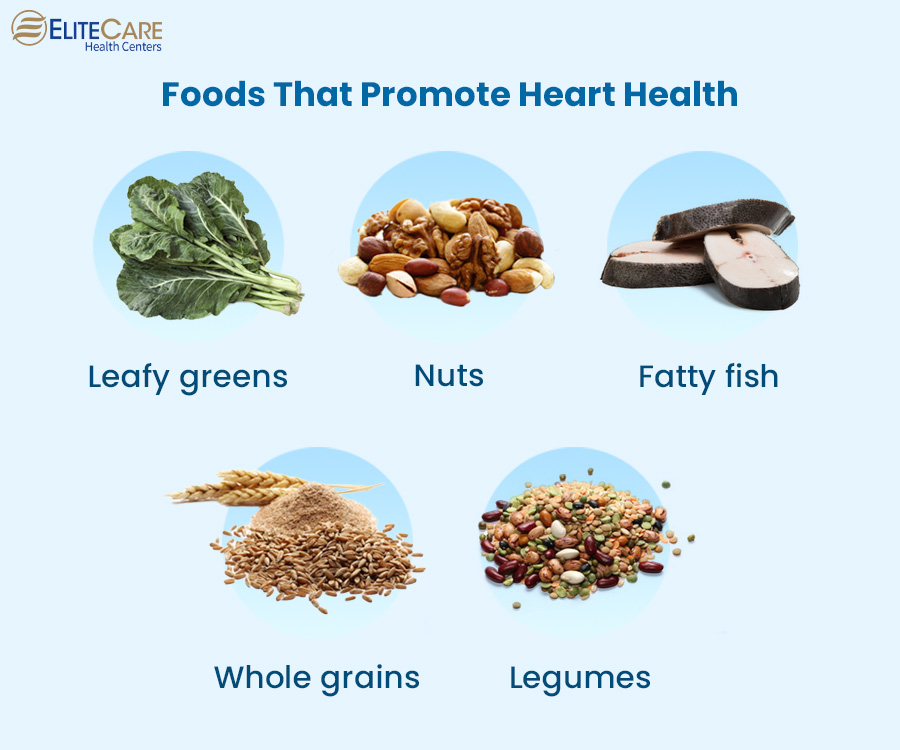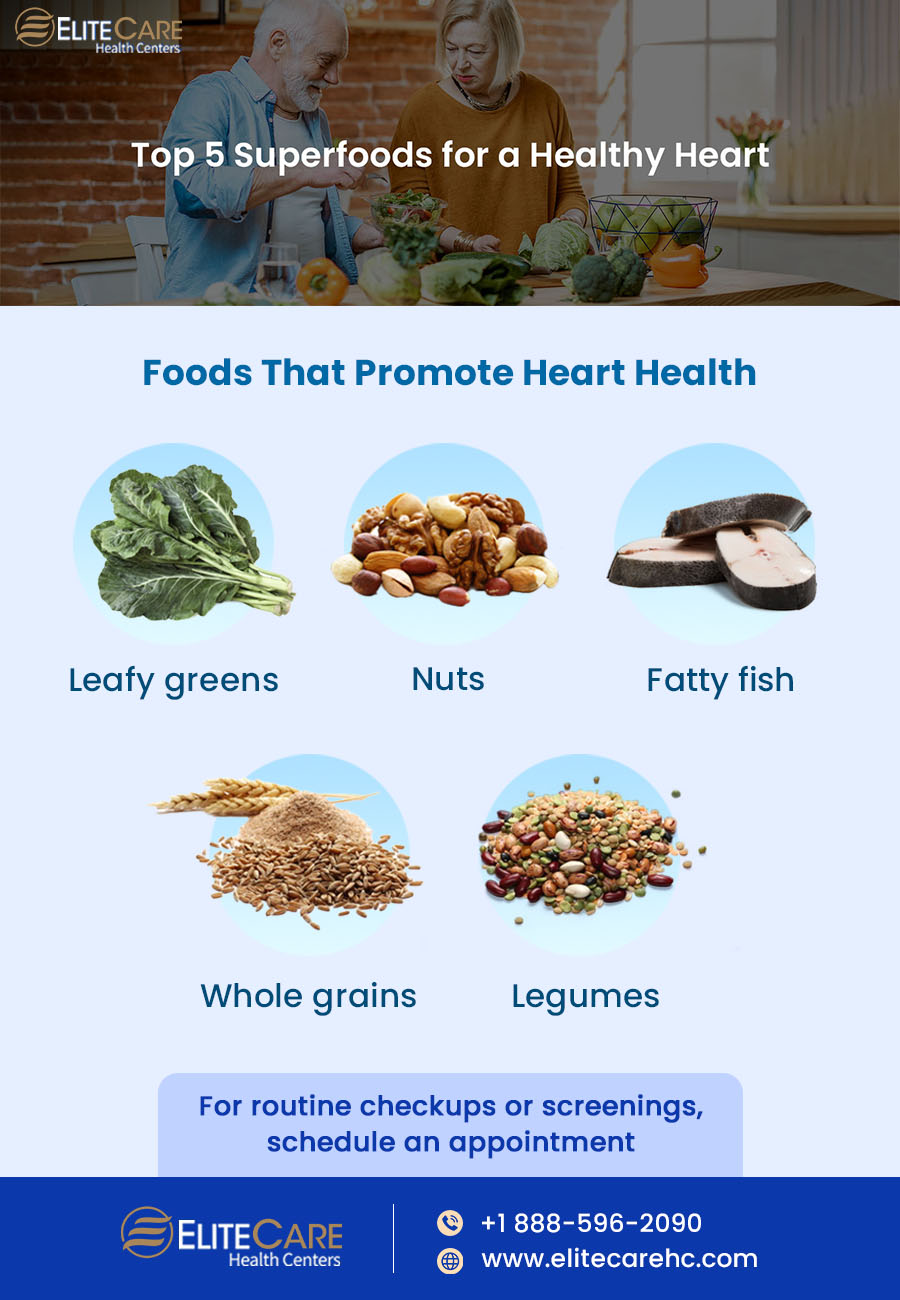
When it comes to maintaining a healthy heart, lifestyle factors have a crucial role to play. Regular exercise, stress management, and good sleep habits are all important for promoting heart health. But perhaps one of the most important factors to consider is our diet. In this blog post, we will explore the relationship between food and heart health, taking a closer look at some of the foods that are beneficial for the heart, as well as those that have been linked to increased risk of heart disease.
According to research, about 46% of American adults eat a low nutrient diet that consists mostly of processed meat, sugary beverages and excess sodium1. Incidentally, heart disease has been the leading cause of mortality in America for the past decade2. This goes to show that a diet deficient in essential nutrients affects the heart’s ability to function optimally. But what is the best diet for heart disease reversal? Read on to find out.
5 Heart-Healthy Foods

There are a number of foods that are excellent for promoting heart health, such as:
Leafy greens
Leafy greens are a nutrient-dense food that can play a vital role in improving heart health. Research shows that eating just one cup of leafy greens (raw or half-cooked) a day can significantly lower the risk of suffering from cardiovascular diseases3. This is because leafy greens like spinach and lettuce are a great source of dietary nitrates. The nitrates in them are converted into nitric oxide in the body, which in turn helps dilate blood vessels and lower systolic blood pressure.
Additionally, leafy greens are abundant in antioxidants, such as vitamin C, vitamin E, and beta-carotene, which can help reduce inflammation, a major risk factor for heart disease. Leafy greens are also high in fiber, which can help lower cholesterol levels.
Fatty fish
Fatty fish like salmon, tuna and sardines are an excellent source of omega-3 fatty acids, which are essential nutrients that the body cannot produce on its own. Research shows that eating just one fatty fish meal per week can significantly reduce the risk of suffering from primary cardiac arrest by 50%4. This is because the Omega-3 in fatty fish can help reduce triglyceride levels in the bloodstream. Triglycerides narrow the blood vessels by causing fatty deposits to build up in the arteries.
Additionally, fatty fish are also known for their anti-inflammatory properties which can help reduce blood pressure and lower the risk of arrhythmias (irregular heartbeats). The fatty acids in fish can also help reduce the production of cytokines and increase the production of anti-inflammatory molecules, such as resolvins and protectins. This can help the body fight against inflammatory responses and beat chronic inflammation.
Nuts
Nuts are a storehouse of protein, fiber and healthy fats. They contain monounsaturated and polyunsaturated fats, which can help lower LDL (bad) cholesterol and increase HDL (good) cholesterol in the body. Studies show that eating nuts a few times a week can help reduce the risk of total cardiovascular disease by 13-19% and coronary heart disease by 15-23%5. In addition to their cholesterol-lowering effects, nuts like almonds, pistachio, walnuts and pecans contain a wide variety of antioxidants that can protect the body against oxidative stress and inflammation.
Whole Grain
Unlike refined grains, which have been processed to remove their nutrient-rich layers, whole grains contain all three parts of the grain – the bran, germ, and endosperm. This means they are loaded with a variety of essential nutrients, including fiber, vitamins, minerals, and antioxidants, that are good for the heart.
Whole grains like oats, for instance, contain a type of fiber called beta-glucan, which has been shown to lower cholesterol levels by reducing its absorption in the intestine6. Studies show that consuming just three grams of soluble fiber from oats per day is associated with a 5-10% reduction in total cholesterol levels and LDL concentration7. Similarly, other whole grains like brown rice, quinoa, barley, bulgur, farro, etc. are also nutrient-rich. Incorporating them into meals by choosing whole grain breads, cereals and pasta can significantly help to improve heart function.
Legumes
Legumes are a versatile and nutrient-rich group of plants that includes beans, lentils, chickpeas, and peas. They are an excellent source of protein, fiber, and a wide range of essential nutrients that promote heart health.
Legumes are a rich source of folate, magnesium and potassium. Folate can reduce the levels of homocysteine, an amino acid linked to an increased risk of heart disease. Magnesium helps maintain a healthy heart rhythm, while potassium lowers blood pressure and reduces the risk of stroke. Moreover, the soluble fiber in legumes binds with cholesterol and bile acids in the digestive tract, preventing their absorption into the bloodstream, which can lower cholesterol levels and improve heart function.
Please note that while certain foods are generally considered beneficial in promoting heart health, it’s important to remember that everyone’s nutritional needs are different. Some people may have nut allergies, for example, and may need to avoid certain foods or ingredients. Additionally, consuming excessive amounts of fatty fish can also have negative health consequences as they contain contaminants like mercury, PCBs and dioxins. Therefore, it’s best to consult a qualified nutritionist or healthcare professional to create a comprehensive and personalized diet for heart disease reversal.
Which Foods Are Detrimental to Heart Health?
Foods that can increase the likelihood of suffering from heart disease include:
- Processed meats such as bacon, sausage, and hot dogs, which are high in saturated fats and sodium.
- Sugary beverages like soda and sweetened fruit juices.
- Processed snacks, such as chips and crackers, are typically high in salt and unhealthy fats.
- Baked goods like cookies, pastries and cakes
- Margarine and other processed spreads, which are high in trans fats.
- Fried or fast food, like chicken nuggets or tenders and cheese or hamburgers.
- Foods high in added sugars, such as candy and ice cream
A diet mainly consisting of the foods mentioned above can build up cholesterol and fat in the arteries, causing them to narrow and harden. This can lead to a condition called atherosclerosis, which narrows the blood flow to vital organs, such as the heart and brain, leading to heart attacks and strokes. It can also weaken the walls of arteries, increasing the risk of aneurysms and ruptures. Atherosclerosis can predispose a person to cardiovascular diseases, such as coronary artery disease, stroke, and peripheral artery disease.
Key Takeaways
- A good diet can help reverse heart disease. Foods that can help improve heart function include leafy greens, fatty fish, nuts, whole grains, and legumes.
- On the other hand, consuming a poor-quality diet that consists of processed food high in saturated or trans-fat, sugar and sodium can create blockages in the heart’s arteries and increase a person’s risk of suffering from heart attack and strokes.
Stay healthy by visiting the nearest EliteCare Health Center clinic which offers services like EKG and screenings to regularly monitor heart health. EliteCare is one of Florida’s best medical clinics, with a team of highly trained primary care physicians who offer services like venipuncture, women’s wellness exams, preventative care and more. Visit our website to schedule an appointment.






